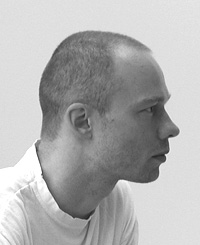|

Paul Evenblij (ps. for Paul Wystan Evanby)was born at Tremadoc, Wales, on June 21, 1885. His father, Sir John Hugh Bairnson, was an Anglo-Irish landholder who left his wife for his family's governess. Paul was the second of five sons produced by this union. Adopting the name Evanby, the family settled in Oxford, where Paul eventually entered university. Specializing in music, mathematics, archaeology, architecture, and history, he began learning Arabic when he visited Egypt and Syria. After graduating in 1907, he worked as an archaeologist in the Middle East until 1910. He returned to England after an incident involving his imprisonment by local bandits, together with the touring escape artist Harry Houdini, into a hitherto unknown subterranean labyrinth beneath the pyramid of Chephren; an incident which left him, in his own words, 'incapable of confronting the burdened subconscious of civilization's cradle' any longer.
Unable to settle into his old life in Oxford, and after failing to obtain a fellowship, he moved to Paris in 1912, seeking to study composition with the ailing Claude Debussy. In 1914 he interrupted his career to serve in the French army. After World War I, he temporarily retired from Paris to a villa at Montfort-l'Amaury, where he devoted himself to composing.
Thus voluntarily isolated from Europe's centres of avant-garde art and culture, he started to evolve his own concept of atonality. Unlike that of Schönberg at the time, his music avoided formal dodecafony altogether, and was heading toward a rigorous, mathematical kind of serialism anticipating Boulez and Stockhausen, when, disappointed by public disinterest and outright hostility, he decided to abandon his compositional activities.
After a six-month stay in Barcelona to advise on the ongoing construction of Antoni Gaudí's Sagrada Familia - following the death of the architect seven years earlier - he returned to England in 1933. Based on the mathematical work published as a spin-off of his compositional activities in the previous decade, he obtained a research studentship at King's College, Cambridge, and a fellowship in 1935. In 1939, as a result of his work in mathematical logic and number theory, he was recruited for the 'Government Code and Cypher School', a department of MI6. After the war he was offered a research post at the National Physical Laboratory, and, in 1948, at Manchester University, where he worked with one of the first digital computers.
During his stay at Manchester he developed the ideas which eventually led to his 'Theory of Unified Semantics', devised as an all-encompassing framework, integrating art and scientific achievement into an 'Algebra of Meaning', which he considered to be a viable alternative to religion. Increasingly at odds with the Manchester establishment, and despite his traumatic archaeological experience of 1910, he moved to Greece in 1954.
Accepting a lecturing position at Athens Polytechnic University, he soon became leader of the 'stochastic narrative' movement, a group of writers who sought to make dramatic structure dependent upon mathematical probability systems. Probably due to his background in history, music and mathematics, Evenblij was one of the very few who actually succeeded in integrating the laws of chance formally into coherent and aesthetically pleasing forms of narrative. In this period he did most of the work leading to the eventual publication of his book Formalized Drama (1971), a comprehensive introduction to the mathematic underpinnings of unified semantics, as applied to story-telling. Owing to his political activities opposing the military regime, he was exiled from Greece in 1968.
After leading a peripatetic life for several years, during which, in his own words, he 'had to come to terms with an increasingly apparent social and cultural darwinism permeating the whole of human endeavour' (an unorthodox take on the spirit of the early Seventies if ever there was one) he returned to England in 1973. His subsequent stay in a mental institution he himself attributes to his inability to resolve the emotional and personal conflicts resulting from his experiences in the previous years.
In 1975 he left England again for the continent, and started work on what he intended to make his magnum opus - a literary undertaking he would be working on for the next 23 years. His by then thoroughly matured theory of unified semantics enabled him to create a compelling framework for a fictional autobiography. Employing principles based on stochastic narrative, he succeeded in painting a portrait of an Oxford-trained archaeologist and architect, born in 1885, who after a harrowing experience in Egypt becomes a composer and mathematician. His subject spends some time in France during and after the Great War, and does a lot of largely unrecognized work in avant-garde art music. He then returns to Britain and works for the government in World War II. After moving to Manchester to become one of the world's first computer programmers, he formulates an ambitious theory about the relation of fiction to reality. This leads to disagreement with the university authorities, which eventually forces him to resign. He is able to continue his work in Greece, until he is exiled for political reasons. He spends two years in a psychiatric hospital in England, after which he moves to the mainland again, where he starts work on a monumental memoir describing the life of an archaeologist and architect turned composer and mathematician who, while wandering around Europe and spending some years in Paris, Manchester and Athens, develops some crackpot theories which eventually land him in an asylum and compel him to write the life of a writer of autobiographies who after many perambulations ends up in Holland.
Recently, he has started to write in Dutch; he has won the prestigious Dutch KKA Award, and in 2001 received the coveted Millennium Prize for best Dutch F/SF story.
|